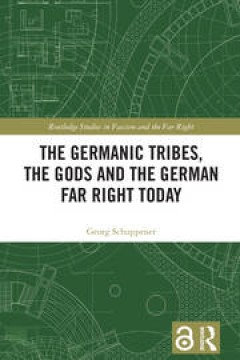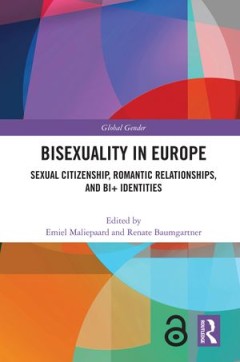Filter by

Archives and Records
This open access book addresses the protection of privacy and personality rights in public records, records management, historical sources, and archives; and historical and current access to them in a broad international comparative perspective. Considering the question “can archiving pose a security risk to the protection of sensitive data and human rights?”, it analyses data security and …
- Edition
- 1
- ISBN/ISSN
- -
- Collation
- -
- Series Title
- -
- Call Number
- XXI, 313

Gender-Competent Legal Education
Male-dominated law and legal knowledge essentially characterized the whole of pre-modern history in that the patriarchy represented the axis of social relations in both the private and public spheres. Indeed, modern and even contemporary law still have embedded elements of patriarchal heritage, even in the secular modern legal systems of Western developed countries, either within the content of…
- Edition
- 1
- ISBN/ISSN
- -
- Collation
- -
- Series Title
- Springer Textbooks in Law
- Call Number
- XIII, 709

One Rights: Human and Animal Rights in the Anthropocene
This is an open access book.Animals are the traditional blind spot in human rights theory. This book brings together the seemingly disparate discourses of human and animal rights, and looks at emerging animal rights as new human rights. It approaches the question whether animals can and should have human rights through a comprehensive review of contemporary human rights philosophy, discussing b…
- Edition
- 1
- ISBN/ISSN
- -
- Collation
- -
- Series Title
- SpringerBriefs in Law
- Call Number
- X, 104

Record-making and record-keeping in early societies
Record-Making and Record-Keeping in Early Societies provides a concise and up-to-date survey of early record-making and record-keeping practices across the world. It investigates the ways in which human activities have been recorded in different settings using different methods and technologies. Based on an in-depth analysis of literature from a wide range of disciplines, including prehistor…
- Edition
- -
- ISBN/ISSN
- 9780429054686
- Collation
- 222 p
- Series Title
- -
- Call Number
- 005 YEO r

Creating and governing cultural heritage in the European Union : the European…
Creating and Governing Cultural Heritage in the European Union: The European Heritage Label provides an interdisciplinary examination of the ways in which European cultural heritage is created, communicated, and governed via the new European Heritage Label scheme. Drawing on ethnographic field research conducted across ten countries at sites that have been awarded with the European Heritage …
- Edition
- -
- ISBN/ISSN
- 9780429053542
- Collation
- 300 p
- Series Title
- -
- Call Number
- 360 LAH c

Marek Thee: My Story
Marek Thee was a Jewish Polish journalist, scholar, and activist. This book tells his life from narrowly escaping death in the Holocaust to exile in Palestine, where he became attached to the Polish consular service. On his return to Poland in 1950, he worked for the Foreign Ministry and later for the Polish Institute for International Affairs. He served as Head of the Polish delegation to the …
- Edition
- 1
- ISBN/ISSN
- -
- Collation
- -
- Series Title
- SpringerBriefs on Pioneers in Science and Practice
- Call Number
- V, 110

The Germanic Tribes, the Gods and the German Far Right Today
ABSTRACT The Germanic Tribes, the Gods and the German Far Right Today deals with the question of how right-wing extremists in German-speaking countries adapt and adopt elements from the history, culture, and mythology of the Germanic tribes. It provides the first in-depth study of the adoption of these historical motifs by right-wing extremists. Using linguistic and historical perspectives,…
- Edition
- -
- ISBN/ISSN
- 9781003206309
- Collation
- -
- Series Title
- -
- Call Number
- -

Theology without walls: the transreligious imperative
Thinking about ultimate reality is becoming increasingly transreligious. This transreligious turn follows inevitably from the discovery of divine truths in multiple traditions. Global communications bring the full range of religious ideas and practices to anyone with access to the internet. Moreover, the growth of the nones and those who describe themselves as spiritual but not religious create…
- Edition
- -
- ISBN/ISSN
- 9780429000973
- Collation
- 268 p
- Series Title
- -
- Call Number
- 200 MAR t

Queer Roma
This book offers in-depth insight into the lives of queer Roma, thus providing rich evidence of the heterogeneity of Roma. The lived experiences of queer Roma, which are very diverse regionally and otherwise, pose a fundamental challenge to one-dimensional, negative misrepresentations of Roma as homophobic and antithetical to European and Western modernity. The book platforms Romani agency a…
- Edition
- -
- ISBN/ISSN
- 9780367822699
- Collation
- 234 p
- Series Title
- -
- Call Number
- 300 FRE q

Bisexuality in Europe : Sexual Citizenship, Romantic Relationships, and Bi+ I…
Bisexuality in Europe offers an accessible and diverse overview of research on bisexuality and bi+ people in Europe, providing a foundation for theorising and empirical work on plurisexual orientations and identities, and the experiences and realities of people who desire more than one sex or genderCounteracting the predominance of work on bisexuality based in Ango-American contexts, this colle…
- Edition
- -
- ISBN/ISSN
- 9781000220841
- Collation
- 222 p
- Series Title
- -
- Call Number
- 336.765 BIS
 Computer Science, Information & General Works
Computer Science, Information & General Works  Philosophy & Psychology
Philosophy & Psychology  Religion
Religion  Social Sciences
Social Sciences  Language
Language  Pure Science
Pure Science  Applied Sciences
Applied Sciences  Art & Recreation
Art & Recreation  Literature
Literature  History & Geography
History & Geography